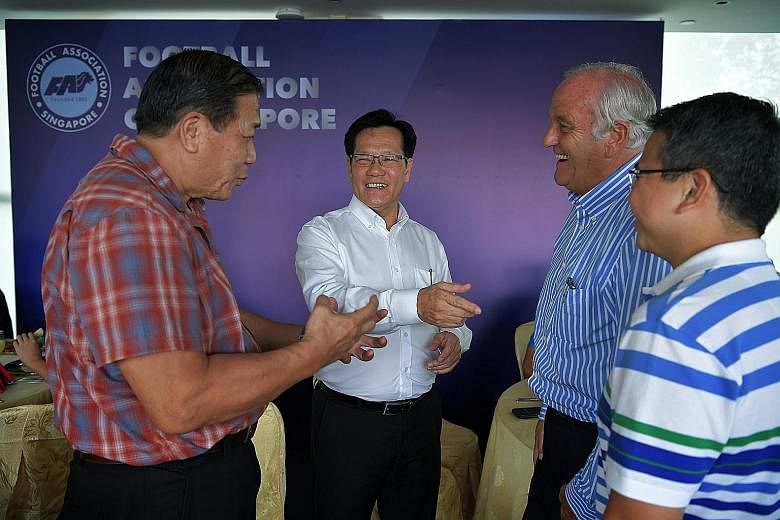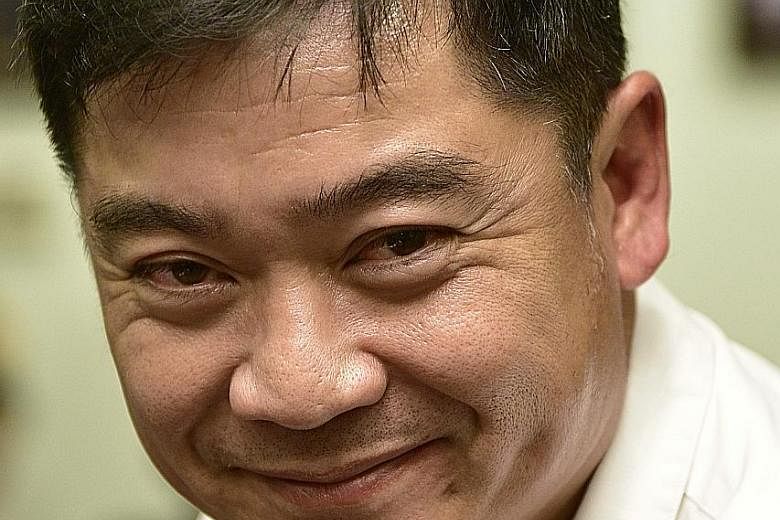A month after its victory in the inaugural Football Association of Singapore (FAS) election, the new council has taken its first steps towards what it called an effort to "clean shop".
In a statement released yesterday, deputy president Bernard Tan announced a series of changes designed to enhance transparency and introduce more checks and balances into the association's operations.
He explained: "The events of the last month, especially (in the days) leading up to the election, had unveiled a significant amount of issues relating to governance in not just the FAS but in football.
"In order to restore stability in the entire eco-system, it's incumbent on the FAS council to treat governance as the first and key issue we have to tackle."
Yesterday, the FAS received input from the "big four" auditing firms - PricewaterhouseCoopers, Ernst & Young, KPMG and Deloitte - in an audit into its Code of Governance.
"Previously, many decisions were centralised with the president and general secretary. We had asked the audit firms to advise us of the best practices and checks and balances," Tan explained.
Nonetheless, he insisted that the change is not a reflection of the previous officials' performance. Former PAP Member of Parliament Zainudin Nordin led the FAS from 2009 to November last year, while the general secretary is Winston Lee, who has held the post since 2008 but whose future is unknown.
"We would have done this even if the general secretary had done exceptionally well because it's not correct," he said.
-
Moving fast to improve governance
-
Football Association of Singapore (FAS) vice-president S. Thavaneson has revealed that the newly elected council has been working hard and fast to deliver on its election promises.
He said that since the team won the inaugural polls on April 29, there have been two council meetings and about "seven to eight" executive committee (exco) meetings in just one month.
The Straits Times understands that in 2015 and last year, the council met twice a year. In that same period, the exco met three times in 2015 and did not meet last year.
With an urgent need to restore stability in the local game, the new council's first priority has been to enhance the governance of Singapore football through these measures:
-
1. The "big four" audit firms - PricewaterhouseCoopers, Ernst & Young, KPMG and Deloitte - have responded to the FAS' request for proposals to audit the association's Code of Governance and advise on best practices.
-
2. Decisions previously centralised with the president and general secretary will now be made by the exco and relevant committees.
-
3. Donations made to the FAS will only be accepted if they are to be used for the benefit of Singapore football. The exco will have to be notified of donations above $50,000.
-
4. The exco is to have oversight of commercial deals signed by the FAS and the remuneration and appointment of high-salaried FAS employees.
-
5. FAS officials must also declare all possible conflicts of interest, as well as any cases of financial embarrassment such as bankruptcy and existence of unsecured debts.
-
6. FAS officials voting in international bodies, such as Fifa and the Asian Football Confederation, will have to discuss how they will vote with the exco before heading to the polls.
Wang Meng Meng
"In the Code of Governance for Charities, the board must exercise governance responsibility over the organisation. If it's (decision-making power) is (limited) only to the president and general secretary, what's the point of the board?
"We are also doing this to be compliant with the Code of Governance for Charities."
The new council has also, with immediate effect, revised the decision-making process at the FAS, with the executive committee (exco) making the key decisions while committees will be put in place to preside over other issues.
Financial approvals will also come under closer scrutiny. Although the details have yet to be fine-tuned, Tan revealed that different tiers of approval will be imposed for different amounts of money.
In the build-up to the April 29 polls, the governance of the country's most heavily-funded national sports association, which reportedly receives $25 million annually from the Tote Board, came under the spotlight.
At the centre of it was the controversial $500,000 Asean Football Federation (AFF) donation saga involving Zainudin, Lee and Hougang United and Tiong Bahru FC chairman and then-FAS presidential candidate Bill Ng.
A dispute erupted between Ng and Lee over who and what the donation was for, and who had requested it.
In the light of the saga - which resulted in a police raid on the FAS office and the clubhouses of Hougang, Tiong Bahru and Woodlands Wellington, another club with ties to Ng - the FAS will also relook its policy on donations.
The exco, comprising president Lim Kia Tong, deputy president Tan and four vice-presidents (S. Thavaneson, Edwin Tong, Razali Saad and Teo Hock Seng), will now be notified of any donation above $50,000. The money will only be accepted if it is to be used for the benefit of local football.
The new collective and consultative approach to decision-making will also extend to external matters. So when officials represent the FAS in voting at international bodies, such as the Fifa and Asian Football Confederation congresses, "the council will have oversight of the voting behaviour".
CIMB economist Song Seng Wun feels that the new FAS council's decision to relook its governance is a positive step, saying: "With the council making more key decisions, it is minimising the possibility of abuse.
"And having an external party not related to the corridors of power (requesting big four audit firms to suggest best practices) gives FAS the confidence to conduct an unbiased review of checks and balances. It is a useful exercise for the president and the council to update the FAS' practices and processes."
Tan believes the move to improve governance can only improve the FAS' battered image.
"Governance and proper conduct starts from the top," he said, pointing out that improved governance had been a key pledge for Lim's team during the election. "We promised quick action and we are happy to say we are ready to start rolling out our plans."



